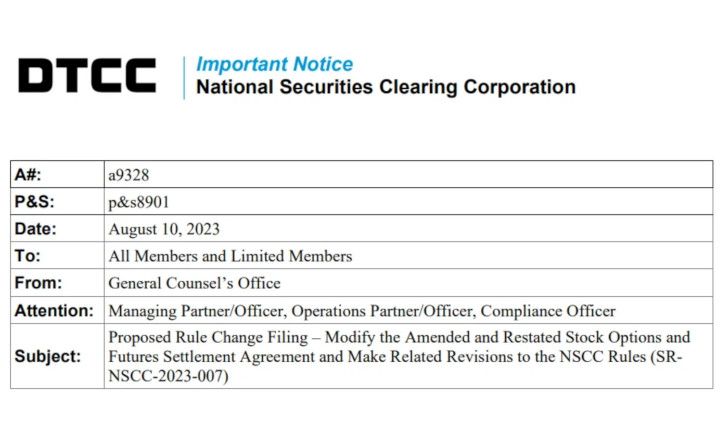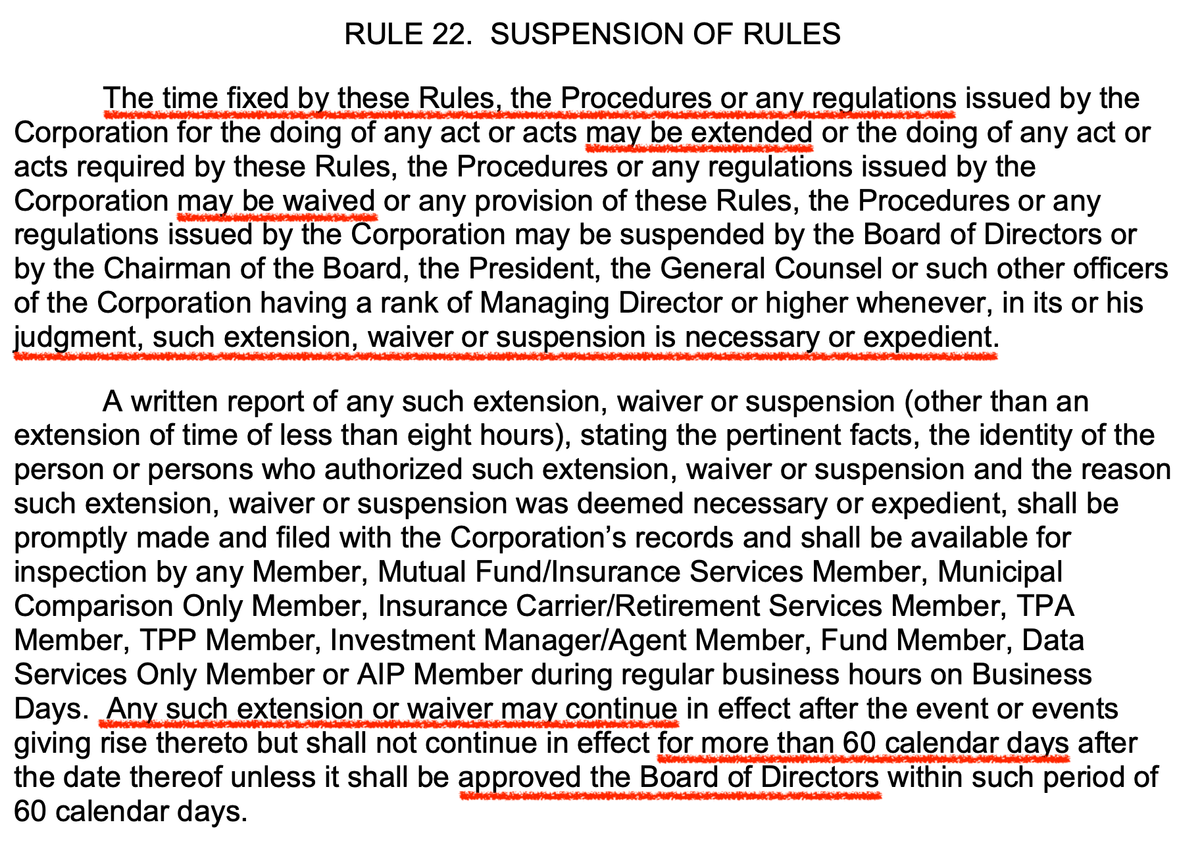NSCC/OCC propose changes to keep NSCC netting for OCC.

Without NSCC, there's no netting for OCC & in January 2022, the largest gross broker-to-broker settlement amount in the case of a larger Clearing Member default would have resulted in liquidity needs of approximately $384,635,833,942 from OCC.





Wut mean?:
- The Existing Accord permits NSCC to opt out of guaranteeing the settlement of specific securities transactions, especially if its member hasn't met the necessary collateral requirements at NSCC. If NSCC refrains from guaranteeing, OCC would have to use an alternative settlement method.
Two issues arise from this:
The cash needed for OCC and its Clearing Members to settle outside NSCC can be considerably higher since transactions would lose the advantage of netting through NSCC.
- The collateral required from Clearing Members in such cases would also need to be liquid to manage risks associated with short-term transaction settlements.
Historical analysis shows that, in worst-case scenarios, settling without NSCC could result in liquidity demands of over $300 billion for OCC.
- Clearing Members would largely carry this financial burden through their contributions to the OCC Clearing Fund.
- There's uncertainty about the Clearing Members' ability to fully fund such demands.
Using NSCC's netting system greatly reduces the value and volume of settlement obligations.
- In 2022, netting through NSCC's CNS system decreased CNS settlement obligations by about 98%, turning $519 trillion to just $9 trillion.
- Without NSCC, there's no netting, so Clearing Members would need to directly coordinate with each other for settlements.
The Clearing Agencies want to update the existing arrangement and related rules.
This update would permit OCC, in the event of a default by a Common Member (a firm part of both OCC and NSCC or one that designates an NSCC member to act for it), to make a cash payment to NSCC.
- Such a payment would guarantee NSCC oversees the settlement of that member's transactions.
With this proposal, OCC would also improve its daily liquidity stress tests to consider the potential of making such payments.
- This adjustment is believed to be beneficial because:
- Settling through NSCC after a default would be simpler operationally.
- It would likely require less liquidity and collateral from market players than the current methods.
- The stress test improvements would ensure OCC has the capacity to make the needed payments during a Common Member default.
How it is currently:

Wut mean?:
The Existing Accord dictates how settlement obligations involving physical delivery of securities in options and futures transactions get transferred between OCC and NSCC:
- The accord applies to transactions requiring physical delivery of underlying securities eligible for NSCC clearing.
- The accord determines when OCC’s settlement guarantee ends and NSCC’s starts. However, if a Common Member defaults, NSCC can reject this transfer. As a result, OCC might resort to more complex and potentially expensive broker-to-broker settlements.
- When NSCC takes on the guarantee, the transactions are netted, simplifying the settlement process, reducing costs, and minimizing operational and market risks.
- NSCC daily informs OCC of securities eligible for clearing. Likewise, OCC sends NSCC a list of securities to be settled. Once NSCC gets all required deposits and ensures all criteria are met, NSCC takes over responsibility for settling those transactions.
- NSCC must inform OCC when their guarantee begins and if any transactions are rejected. If NSCC stops acting for a Common Member (e.g., due to default), OCC would stop submitting transactions involving that member, unless both parties agree otherwise.
- The Existing Accord allows some flexibility wherein NSCC might process additional transactions of a defaulting member. However, this optional provision creates uncertainties for market participants.
Proposed Changes:

Wut mean?:
The suggested amendments to the Existing Accord allow the OCC to make a "Guaranty Substitution Payment" (GSP) to NSCC.
- This payment could be made when a Common Clearing Member faces suspension and/or the following business day.
- Once NSCC receives the GSP from OCC, NSCC would handle the suspended member's transactions for clearance and settlement.
- To fund the GSP, OCC can tap into the contributions of all Clearing Members to the OCC Clearing Fund and certain assets from the defaulted member.
- NSCC would determine the GSP amount by combining the suspended member’s outstanding deposit to the NSCC Clearing Fund with any unpaid supplemental liquidity obligations related to E&A/Delivery Transactions.
NSCC, when calculating the Guaranty Substitution Payment (GSP), would evaluate the suspended member's outstanding Clearing Fund obligations.
- They would compare day-to-day shifts in the member’s overall market value and their NSCC Clearing Fund requirements to pinpoint how much of this change is due to activities stemming from OCC.
- If all the changes in the Clearing Fund requirement are because of OCC-related activities, then the GSP would cover the full Clearing Fund obligation.
- If only a portion of the change is due to OCC, the GSP would cover just that part.
- Moreover, the unpaid portion of the member’s Supplemental Liquidity Deposit (SLD) linked to E&A/Delivery Transactions is added.
- The intent is to ensure that the GSP covers risks posed by the member's activities from OCC to NSCC accurately.
Every business day, NSCC will give OCC details about the Required Fund Deposit, Supplemental Liquidity Deposit obligations, the gross market value of the E&A/Delivery Transactions, and the total Net Unsettled Positions.
- On specific days when options expire (Fridays), NSCC will also share details about liquidity requirements and any intraday SLD requirements of shared members.

Wut mean?:
A historical study revealed that, in a worst-case scenario, OCC would need about $384.6 billion for gross broker-to-broker settlement.
- But the corresponding GSP would only have been around $863.6 million.
Other high liquidity demands during the study were far more than OCC's available resources.
- However, projected GSPs, which ranged from $419.3 million to $6.3 billion, could be covered by the required contributions from Clearing Members.
To overcome the technology limitations hindering NSCC's precise daily GSP calculation for every Common Member, new provisions are proposed.
- These allow for recalculating the GSP for a Mutually Suspended Member by assessing the effect of E&A/Delivery Transactions.
- This adjusted value would then replace the original GSP's Required Fund Deposit component, but the SLD part remains the same.
- The GSP addresses the collateral and liquidity challenges OCC Clearing Members might face during a Common Member default.
- NSCC and OCC have decided to restrict the new provision to the day of a Common Member's default and the following business day. This is based on past data showing most activities of a Mutually Suspended Member are settled within this timeframe.
If OCC doesn't suspend a defaulting Common Member or decides not to pay the full Guaranty Substitution Payment to NSCC, then the affected transactions will be removed from NSCC’s accounting operations.
- In this case, NSCC won't guarantee or settle these transactions, and they would remain under OCC's guarantee based on OCC's regulations.
- Section 14 of the Existing Accord would be modernized to provide that notices between the parties would be provided by e-mail rather than by hand, overnight delivery service or first-class mail.
How to comment:
- Use the Commission’s online form at (http://www.sec.gov/rules/sro.shtml);
- Or, email [email protected] with the subject line: "File Number SR-NSCC-2023-007".
TLDRS:
- The Clearing Agencies want to update the existing arrangement and related rules.
- Without NSCC, there's no netting, so Clearing Members would need to directly coordinate with each other for settlements.
- This update would permit OCC, in the event of a default by a Common Member (a firm part of both OCC and NSCC or one that designates an NSCC member to act for it), to make a cash payment to NSCC.
- Such a payment would guarantee NSCC oversees the settlement of that member's transactions.
- In 2022, netting through NSCC's CNS system decreased CNS settlement obligations by about 98%, turning $519 trillion to just $9 trillion.
- A historical study revealed that, in a worst-case scenario, OCC would need about $384.6 billion for gross broker-to-broker settlement.
- Section 14 of the Existing Accord would be modernized to provide that notices between the parties would be provided by e-mail rather than by hand, overnight delivery service or first-class mail.



